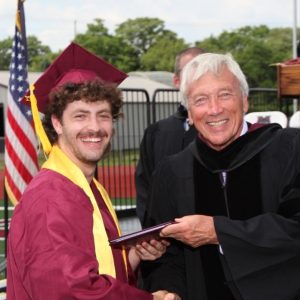Every year, Veriheal celebrates the power of education by awarding the Innovation in Cannabis Scholarship to a select group of cannabis-minded students with big ideas. We know college is expensive, and we’re committed to investing in the next generation of cannabis industry leaders in the hope of seeing their one-of-a-kind inventions and solutions come to life one day.
Applicants, who came from a colorful variety of academic backgrounds, were asked to submit a 1,000-word essay detailing how they would improve the cannabis industry. Winners were chosen based on the novelty and sustainability of their ideas, which ranged from cannabis-derived art supplies to dispensary co-ops to yeast-based cannabinoids. These bright innovators will receive $5,000 each to be used toward college tuition and fees.
We are honored to present the five recipients of Veriheal’s 2022 Innovation in Cannabis Scholarship.
Harrison Brown

School: Worcester Polytechnic Institute
Major/Program: Molecular cell biology
Innovation: The cannabis plant’s naturality is one of its biggest draws as a medical treatment, but cultivating it isn’t always great for the environment due to factors like heavy fertilizer use and high water consumption. Harrison proposes an alternative way of harvesting cannabinoids like THC. Using gene-editing technology, yeast can be engineered to produce cannabinoids. Compared to cannabis, however, yeast emits less CO2, requires less water, and is overall more cost-effective. Producing cannabinoids with yeast would reduce environmental impact drastically while also lowering costs for medical cannabis patients.
Freedom Shiloh Laycox

School: University of Arkansas
Major/Program: Chemical engineering
Innovation: With hundreds of cannabis strains available, each boasting unique ratios of cannabinoids and terpenes, it can be overwhelming and difficult for medical patients to determine which ones are best for their condition(s). Freedom’s solution is intensive clinical research that will unveil specific benefits and uses for each strain and provide more insight into the impact of the cannabis plant’s various compounds on medical conditions. Findings would be compiled into a public database in the interest of better educating patients and their doctors about the wide scope of medical cannabis and ensuring patients get the care they need.
Sarahi Gonzalez

School: Beloit College
Major/Program: Art
Innovation: On top of being expensive, art supplies are often chock-full of chemicals, making them both undesirable and unaffordable for many aspiring artists. Cannabis, however, could potentially solve these issues. Sarahi’s vision involves a new sector of cannabis products: cannabis-derived art supplies. Cannabis and hemp plants would be used to effectively and economically make things like paint pigments, textured paper, blenders, and paint brushes. Sarahi believes this venture would expand the scope of the cannabis industry while making art supplies more natural and accessible.
Michael Shmilovich

School: University of Maryland
Major/Program: Medical cannabis science and therapeutics
Innovation: Most cannabis consumers don’t play much of a role in their local dispensaries, but Michael wants to change that with a new system that captures the neighborly spirit of the cannabis community—dispensary co-ops. For a monthly investment, consumers could become stakeholders in their local dispensaries in exchange for various perks. Michael also suggests implementing “buddy systems” in which co-op members assist elderly or disabled patients with their cannabis purchases, as well as social programs like roundtable discussions and “Meet Your Grower” field trips to help consumers connect with and learn from one another.
Melissa Leedy

School: Pennsylvania Institute of Technology
Major/Program: Cannabis health therapy
Innovation: Senior citizens stand to benefit drastically from medical cannabis, whether to help alleviate physical symptoms of aging or combat the poor mental health that often comes with transitioning into assisted living settings. With this in mind, Melissa introduced the concept of cannabis-centric retirement communities and retreats. Aside from allowing medical cannabis treatment, these communities would offer on-site dispensaries, salon services featuring cannabis-based products, and gardens for residents to grow their own plant medicine. Melissa believes this enterprise would change the nature of retired living and grant elderly people a better quality of life.
We can’t wait to see these driven professionals do big things. If you’re a student with a mind-blowing idea for progressing the cannabis industry, keep an eye out in the spring—next year’s contest will be here in no time.
Author, Share & Comments





















